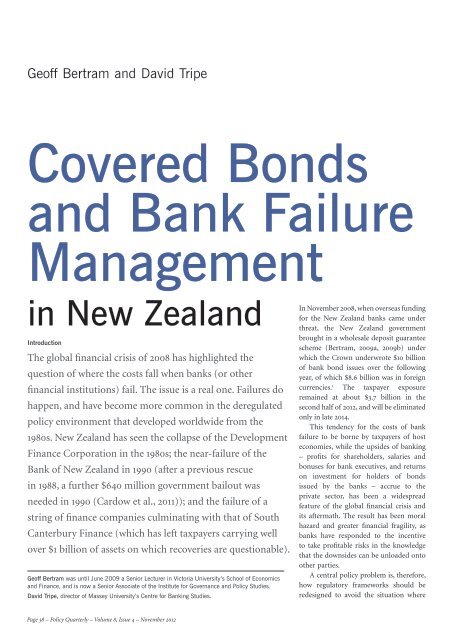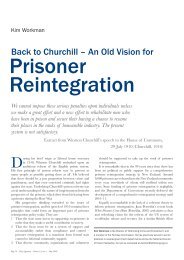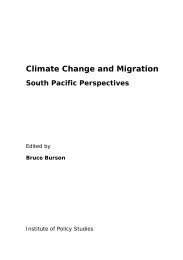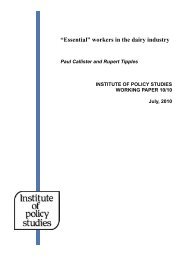PDF File - Institute for Governance and Policy Studies - Victoria ...
PDF File - Institute for Governance and Policy Studies - Victoria ...
PDF File - Institute for Governance and Policy Studies - Victoria ...
You also want an ePaper? Increase the reach of your titles
YUMPU automatically turns print PDFs into web optimized ePapers that Google loves.
Geoff Bertram <strong>and</strong> David Tripe<br />
Covered Bonds<br />
<strong>and</strong> Bank Failure<br />
Management<br />
in New Zeal<strong>and</strong><br />
Introduction<br />
The global financial crisis of 2008 has highlighted the<br />
question of where the costs fall when banks (or other<br />
financial institutions) fail. The issue is a real one. Failures do<br />
happen, <strong>and</strong> have become more common in the deregulated<br />
policy environment that developed worldwide from the<br />
1980s. New Zeal<strong>and</strong> has seen the collapse of the Development<br />
Finance Corporation in the 1980s; the near-failure of the<br />
Bank of New Zeal<strong>and</strong> in 1990 (after a previous rescue<br />
in 1988, a further $640 million government bailout was<br />
needed in 1990 (Cardow et al., 2011)); <strong>and</strong> the failure of a<br />
string of finance companies culminating with that of South<br />
Canterbury Finance (which has left taxpayers carrying well<br />
over $1 billion of assets on which recoveries are questionable).<br />
Geoff Bertram was until June 2009 a Senior Lecturer in <strong>Victoria</strong> University’s School of Economics<br />
<strong>and</strong> Finance, <strong>and</strong> is now a Senior Associate of the <strong>Institute</strong> <strong>for</strong> <strong>Governance</strong> <strong>and</strong> <strong>Policy</strong> <strong>Studies</strong>.<br />
David Tripe, director of Massey University’s Centre <strong>for</strong> Banking <strong>Studies</strong>.<br />
In November 2008, when overseas funding<br />
<strong>for</strong> the New Zeal<strong>and</strong> banks came under<br />
threat, the New Zeal<strong>and</strong> government<br />
brought in a wholesale deposit guarantee<br />
scheme (Bertram, 2009a, 2009b) under<br />
which the Crown underwrote $10 billion<br />
of bank bond issues over the following<br />
year, of which $8.6 billion was in <strong>for</strong>eign<br />
currencies. 1 The taxpayer exposure<br />
remained at about $3.7 billion in the<br />
second half of 2012, <strong>and</strong> will be eliminated<br />
only in late 2014.<br />
This tendency <strong>for</strong> the costs of bank<br />
failure to be borne by taxpayers of host<br />
economies, while the upsides of banking<br />
– profits <strong>for</strong> shareholders, salaries <strong>and</strong><br />
bonuses <strong>for</strong> bank executives, <strong>and</strong> returns<br />
on investment <strong>for</strong> holders of bonds<br />
issued by the banks – accrue to the<br />
private sector, has been a widespread<br />
feature of the global financial crisis <strong>and</strong><br />
its aftermath. The result has been moral<br />
hazard <strong>and</strong> greater financial fragility, as<br />
banks have responded to the incentive<br />
to take profitable risks in the knowledge<br />
that the downsides can be unloaded onto<br />
other parties.<br />
A central policy problem is, there<strong>for</strong>e,<br />
how regulatory frameworks should be<br />
redesigned to avoid the situation where<br />
Page 38 – <strong>Policy</strong> Quarterly – Volume 8, Issue 4 – November 2012













